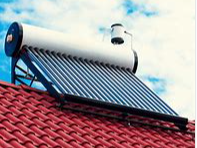From "boiler", "mains" and "electric shower" I gather you are in UK-influenced areas.
I am looking for non fossil fuel heating for space and water.
We want to keep the same pressure we get off mains as we do not like the low flow rate with electric showers.
OK, seems like a bit of a values conflict, environmentalism without sacrifice, but let's see if a triumph of technology can prevail.
What went wrong with the electric showers?
A British style electric shower is 8500 or 9500 watts (VA). And the basic unit of measure of heat energy is the kilocalorie (which is the energy needed to heat 1 kilogram/1 litre of water 1 degree C). Now, let's do some computation.
It's winter and you're taking in water at 5C. You want it at 40C. That means you need a 35C heat increase.
1 watt is 0.860 kilocalories per hour. So a 9500 watt heater can make 8170 kcal/hr. How much water can it raise 1 degree C per hour? 8170 litres. How much can it raise 35C per hour? 233 litres.
Or 3.89 litres/minute. Or 1 gallon per minute.
That's a coarse rule of thumb: 10,000 watts gives 4 litres per minute.
Well, no wonder.
Let's step it up.
A modern California "low flow" shower head is 1.5 gallons/min. You probably want double that or 3 gallons/minute. Or 11.36 litres/min. That is 700 litres/hour.
700 litres/hour x 35 degree lift = 24,500 kilocalories/hour.
So to sustain that rate, you need 28,488 watts.
At 230V, that will be 124 amps.
Assuming 3-phase power, you'll be at 41 amps per phase.
The minimum electric service they offer in the USA these days is 200A @ 240V (48,000 watt). So tankless heaters as large as 36,000 watts are within the reach of US customers provided not too much else in the house is electric. Most of them use 3 circuits of 240V each, which is necessary due to the eccentric way the USA gets to 240V, but it's also designed to be compatible with European "230V" 3-phase power.
In Europe they don't bring you 200A of a single phase, they have all 3 phases up at the pole, so they simply bring you down all 3 phases at 65 amps each. At that point you just need to make sure your chosen heater is designed for 3-phase operation, which it will be if it's marketed in Europe.

